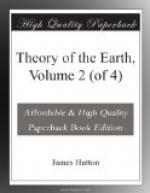Here is a compound system of things, forming together one whole living world; a world maintaining an almost endless diversity of plants and animals, by the disposition of its various parrs, and by the circulation of its different kinds of matter. Now, we are to examine into the necessary consequence of this disposition of things, where the matter of this active world is perpetually moved, in that salutary circulation by which provision is so wisely made for the growth and prosperity of plants, and for the life and comfort of its various animals.
If, in examining this subject, we shall find that there is nothing in the system but what is necessary, that is, nothing in the means employed but what the importance of the end requires; if we shall find that the end is steadily pursued, and that there is no deficiency in the means which are employed; and if it shall be acknowledged that the end which is attained is not idle or insignificant, we then may draw this conclusion, That such a system is in perfect wisdom; and therefore that this system, so far as it is found corresponding properly with natural appearances, is the system of nature, and not the creature of imagination.
Let us then take a cursory view of this system of things, upon which we have proceeded in our theory, and upon which the constitution of this world seems to depend.
Our solid earth is every where wasted, where exposed to the day. The summits of the mountains are necessarily degraded. The solid and weighty materials of those mountains are every where urged through the valleys, by the force of running water. The soil, which is produced in the destruction of the solid earth, is gradually travelled by the moving water, but is constantly supplying vegetation with its necessary aid. This travelled soil is at last deposited upon the coast, where it forms most fertile countries. But the billows of the ocean agitate the loose materials upon the shore, and wear away the coast, with the endless repetitions of this act of power, or this imparted force. Thus the continent of our earth, sapped in its foundation, is carried away into the deep, and sunk again at the bottom of the sea, from whence it had originated.
We are thus led to see a circulation in the matter of this globe, and a system of beautiful economy in the works of nature. This earth, like the body of an animal, is wasted at the same time that it is repaired. It has a state of growth and augmentation; it has another state, which is that of diminution and decay. This world is thus destroyed in one part, but it is renewed in another; and the operations by which this world is thus constantly renewed, are as evident to the scientific eye, as are those in which it is necessarily destroyed. The marks of the internal fire, by which the rocks, beneath the sea are hardened, and by which the land is produced above the surface of the sea, have nothing in them which is doubtful or ambiguous. The destroying operations again, though placed within the reach of our examination, and evident almost to every observer, are no more acknowledged by mankind, than is that system of renovation which philosophy alone discovers.




